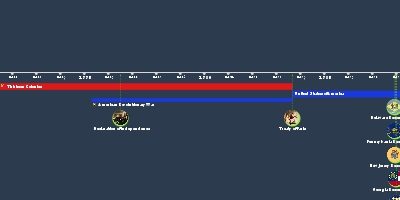6 März 1820 Jahr - Missouri Compromise
Beschreibung:
The Missouri Compromise was United States federal legislation that admitted Maine to the United States as a free state, simultaneously with Missouri as a slave state—thus maintaining the balance of power between North and South in the United States Senate. As part of the compromise, the legislation prohibited slavery north of the 36°30′ parallel, excluding Missouri. The 16th United States Congress passed the legislation on March 3, 1820, and President James Monroe signed it on March 6, 1820.Earlier, in February 1819, Representative James Tallmadge Jr., a Jeffersonian Republican from New York, submitted two amendments to Missouri's request for statehood, which included restrictions on slavery. Southerners objected to any bill that imposed federal restrictions on slavery, believing that slavery was a state issue settled by the Constitution. However, with the Senate evenly split at the opening of the debates, both sections possessing 11 states, the admission of Missouri as a slave state would give the South an advantage. Northern critics including Federalists and Democratic-Republicans objected to the expansion of slavery into the Louisiana Purchase territory on the Constitutional inequalities of the three-fifths rule, which conferred Southern representation in the federal government derived from a state's slave population. Jeffersonian Republicans in the North ardently maintained that a strict interpretation of the Constitution required that Congress act to limit the spread of slavery on egalitarian grounds. "[Northern] Republicans rooted their antislavery arguments, not on expediency, but in egalitarian morality"; and "The Constitution [said northern Jeffersonians], strictly interpreted, gave the sons of the founding generation the legal tools to hasten the removal of slavery, including the refusal to admit additional slave states.".
When free-soil Maine offered its petition for statehood, the Senate quickly linked the Maine and Missouri bills, making Maine admission a condition for Missouri entering the Union as a slave state. Senator Jesse B. Thomas of Illinois added a compromise proviso that excluded slavery from all remaining lands of the Louisiana Purchase north of the 36° 30' parallel. The combined measures passed the Senate, only to be voted down in the House by those Northern representatives who held out for a free Missouri. Speaker of the House Henry Clay of Kentucky, in a desperate bid to break the deadlock, divided the Senate bills. Clay and his pro-compromise allies succeeded in pressuring half the anti-restrictionist House Southerners to submit to the passage of the Thomas proviso, while maneuvering a number of restrictionist House northerners to acquiesce in supporting Missouri as a slave state. The Missouri question in the 15th Congress ended in stalemate on March 4, 1819, the House sustaining its northern antislavery position, and the Senate blocking a slavery restricted statehood.
The Missouri Compromise was controversial at the time, as many worried that the country had become lawfully divided along sectional lines. The Kansas–Nebraska Act effectively repealed the bill in 1854, and the Supreme Court declared it unconstitutional in Dred Scott v. Sandford (1857). This increased tensions over slavery and eventually led to the Civil War.
Zugefügt zum Band der Zeit:
Datum:
6 März 1820 Jahr
Jetzt
~ 205 years ago
